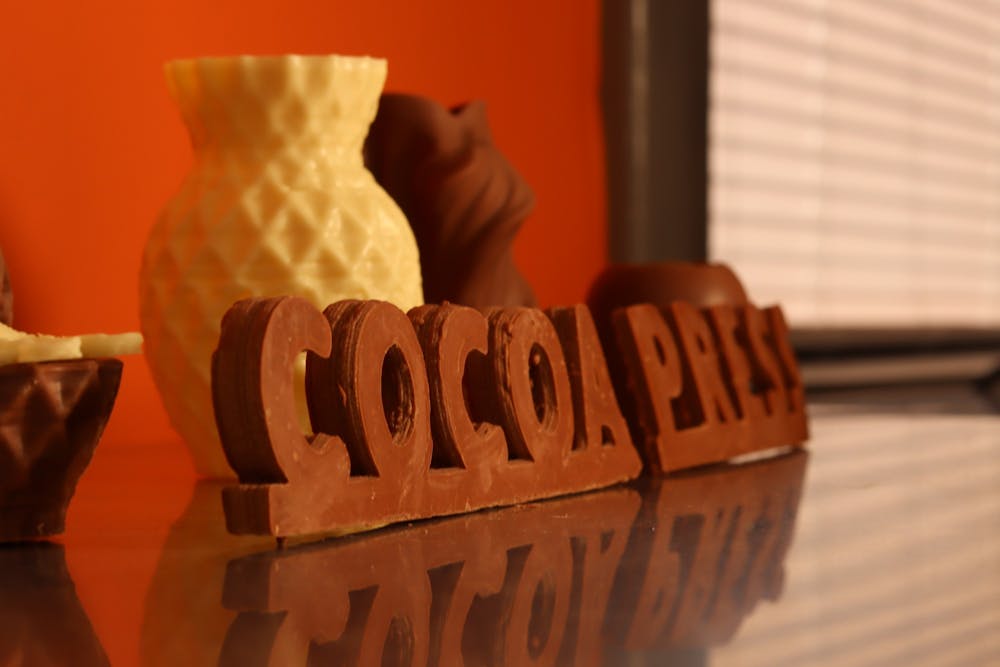
2019 Engineering graduate Evan Weinstein is the founder of Cocoa Press. (Photo from Evan Weinstein)
If there were one food 2019 Engineering graduate Evan Weinstein was going to start a business 3D-printing, it was going to be chocolate.
“Everyone has a connection to chocolate. When you say chocolate to people, their eyes light up immediately,” Weinstein said. “It doesn't quite feel the same when people say they are 3D printing like, guacamole or hummus, or something.”
Cocoa Press, Weinstein's chocolate printing business, builds and sells 3D chocolate printers to customers wanting to create unique chocolate designs. The company launched its first prototype printer on Oct. 10, Weinstein said, and clients can pre-order a printer through the Cocoa Press website and printers will be shipped out next summer.
Weinstein said that Cocoa Press allows for custom-designed chocolate that’s both on-demand and cost-effective. If customers were to go elsewhere to have their chocolate molded, Weinstein said it could cost upward of $500 and take up to six weeks to make. But with a 3D printer, a design can be printed within an hour. Cocoa Press sells printers for $5,500.
Once an image is scanned in, Weinstein said, the printer builds the object out of chocolate, layer by layer, into whatever design a user inputs.
“We might make custom cake toppers," Weinstein said. "Or scan someone's head, or their dog, and print that out of chocolate."
The printers use all food-grade stainless steel to ensure all chocolate printed is safe and edible, according to the Cocoa Press website. Weinstein added that any machinery the chocolate touches in the printer can be easily removed and washed after each use.
Interested in 3D printing since high school, Weinstein started working on Cocoa Press as a senior at Springside Chestnut Hill Academy in Philadelphia. There, he used laser cutters and other 3D printers to build his own prototype for a chocolate printer.
Although Weinstein considered other career options while studying mechanical engineering at Penn, he was always drawn back to Cocoa Press.
Weinstein first saw Cocoa Press as a potential career path while working at Penn Engineering's Additive Manufacturing Lab during the summer of his junior year. He brought his printer to the 2017 New York Maker Faire and saw the project spark interest from a business perspective.
“People started asking me how they could buy it, which was hilarious because I had finished that prototype about three days earlier and there was one of them in the world,” he said. “But it kind of put something in the back of my mind.”
Determined to set his idea into motion in his senior year, Weinstein worked on Cocoa Press as his senior design Capstone Project and took six courses in the engineering entrepreneurship minor. Weinstein said he is grateful for the flexibility of Penn’s curriculum which allowed him to customize his schedule senior year to fit his work with Cocoa Press.
“By second semester, it was really cool because Cocoa Press was suddenly two out of four of my classes,” he said.
Weinstein said his senior design project leader engineering lecturer Graham Wabiszewski and entrepreneurship professor Jeffery Babin were supportive throughout the process. He said it was helpful to still be in school and have the Penn support network as he set his project into motion.
“I went and met with professors who know everything there is to know about fluid dynamics or heat transfer or whatever it was,” Weinstein said. “To be able to have that network at Penn was really exciting and really special.”

After applying for multiple grants, Weinstein won the Miller Innovation Fellowship from the Engineering Entrepreneurship Program and was accepted into the 2019 Pennovation Summer Accelerator — a program providing mentorship and networking to local start-ups.
“It took the classes I'd taken one step further, where instead of everyone's companies being this theoretical idea in the classroom, I was suddenly around eight other companies who are actually trying to start their businesses,” Weinstein said.
Through the Pennovation Accelerator, Weinstein made Cocoa Press into an official company. His current office remains at the Pennovation Center, but his company has expanded to hire employees who are graduates from colleges around the Philadelphia area.
When the COVID-19 pandemic slammed the northeastern United States in the spring, Weinstein halted production of chocolate to instead use his 3D printers to create personal protective equipment to support Project Shields.
Despite his chosen career path, Weinstein said he actually doesn’t have a particularly strong sweet tooth.
“I like chocolate but in no way am I a chocolate fanatic, which I think is just hilarious because I now know more about chocolate than most people should ever know about chocolate,” he said.
Weinstein’s wooden high school prototype sits on the top shelf behind his desk alongside his senior design project. As he looks up at them, Weinstein said it feels unreal to consider the journey of turning his hobby into a real company.
“This was supposed to be a one semester intro to engineering project, it ends up becoming a full year project. And that ended up becoming my job after graduating college,” he said.
In the future, Weinstein said he hopes to get his printer into the hands of as many clients as possible. He is excited to see how individuals with non-mechanical engineering backgrounds make use of the technology.
“Our 3D printer is an interesting one because people ask me all the time, what can you make with it? And the answer is, I don't know, I only have the ideas that I've had,” he said. “I'm really excited to see what people make with the printers once we ship them.”
The Daily Pennsylvanian is an independent, student-run newspaper. Please consider making a donation to support the coverage that shapes the University. Your generosity ensures a future of strong journalism at Penn.
Donate






